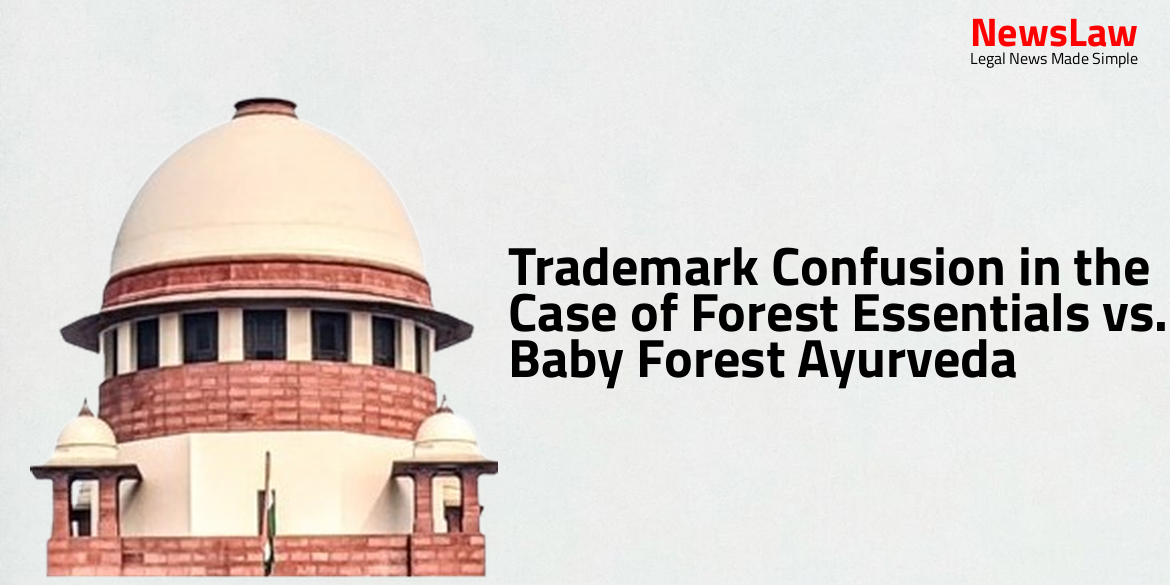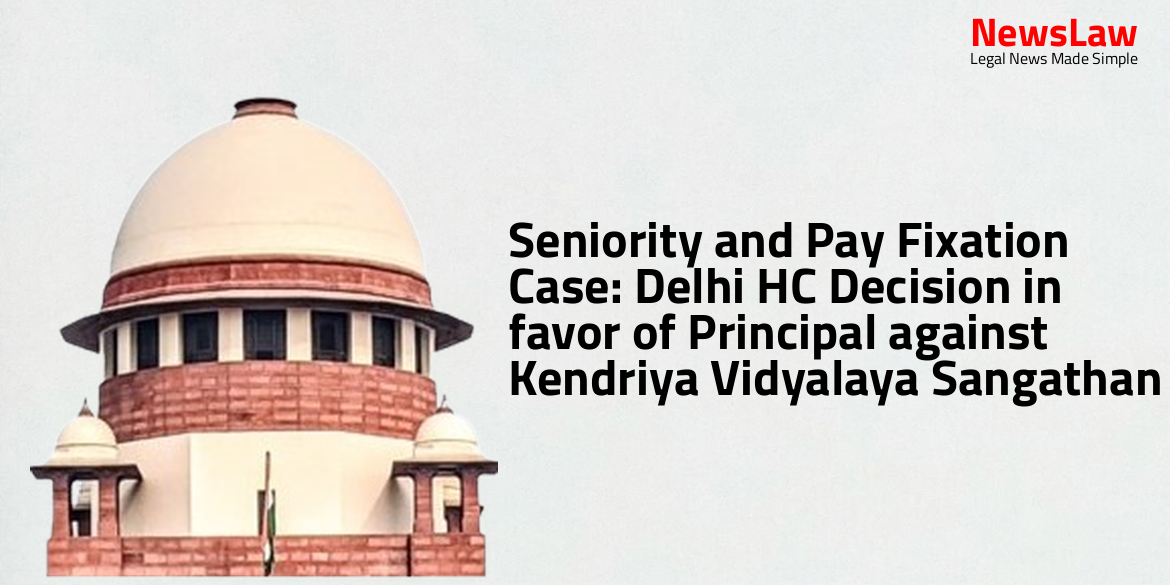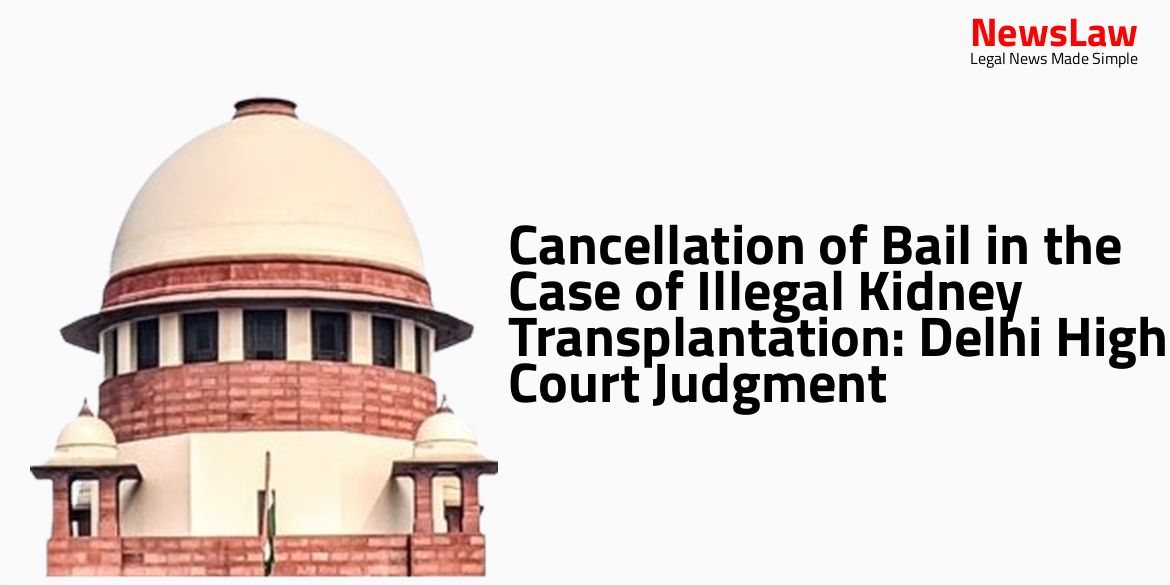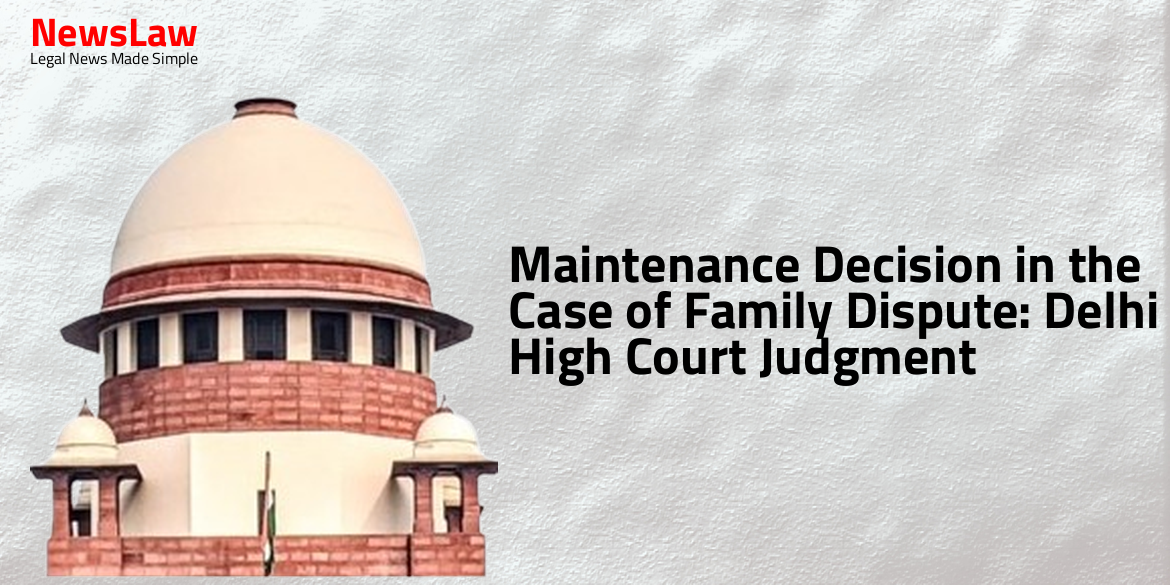Exploring the complexities of trademark confusion, the case of Forest Essentials vs. Baby Forest Ayurveda presents a fascinating legal battle analyzed by the Delhi High Court. Dive into the dynamics of brand protection and consumer behavior in the modern retail sphere. 🌿⚖️
Facts
- The plaintiff sought ad interim injunction as part of the suit for permanent injunction against the defendants.
- The plaintiff’s trademarks in question are ‘FOREST ESSENTIALS’, ‘BABY ESSENTIALS’, ‘FOREST ESSENTIALS-BABY ESSENTIALS’, ‘LUXURIOUS AYURVEDA’, and ‘SOUNDARYA’.
- The plaintiff sought protection from direct or indirect infringement of their trademarks by the defendants.
Arguments
- The appellant has a single store despite a turnover of Rs. 79 crores, indicating high-value items and not necessarily establishing the reputation associated with the VASUNDHRA Trademarks.
- The products of the plaintiffs and defendants are packaged differently, with distinct trademarks, stylization, trade dress, and overall packaging layout.
- The ‘Tree’ logo used by the defendants is distinctive, emanating from a cradle and focused on baby care products, while the plaintiff’s logo is more akin to a ‘tree of life sketch’ associated with a range of products.
- Defendants relied on initial interest confusion of consumers by using a similar ‘Tree’ logo and emphasizing ‘FOREST’ in their product branding.
- Plaintiff claims to supply products to over 500 hotel chains, exports to 120 countries, and is available on online platforms like Amazon and Flipkart.
- Senior Counsel for plaintiff emphasized the continuous use of the mark ‘FOREST ESSENTIALS’ since 2000, with over 150 stores, annual sales of Rs. 425 crores, and substantial investment in advertising.
- Plaintiff launched baby products in 2006, and the word ‘FOREST’ being a common term does not grant exclusive rights, yet plaintiff aims to prevent monopolization of the baby care market.
- Defendants opposed plaintiff’s trademark application based on deceptive adoption and prior usage of ‘FOREST ESSENTIALS BABY’.
- The appellant lacked registration of the word mark ‘VASUNDHRA’, although holding registrations for composite marks containing ‘Vasundhra’.
- Defendants were estopped from denying confusion between plaintiff’s and their marks after acknowledging the similarity.
- Plaintiff presented evidence through invoices, certificates, articles, and other sources to establish prior usage and reputation in ‘FOREST ESSENTIALS’ since 2000.
- Plaintiff’s trademark registrations cover word and logo marks for ‘FOREST ESSENTIALS’ in multiple classes, including Class 3, with significant annual sales in baby products.
- In conclusion, Senior Counsel for plaintiff argued that the evidence presented was sufficient to demonstrate consumer confusion with defendants’ products being associated with plaintiff.
- The plaintiff did not seek registration of the marks ‘FOREST ESSENTIAL BABY’ and ‘FOREST ESSENTIALS-BABY ESSENTIALS’ until 9 August 2023.
- The use of the words ‘Baby’ and ‘Baby Essentials’ by the plaintiff was deemed as descriptive terms alongside their main house mark ‘FOREST ESSENTIALS’.
- There is no substantial evidence provided by the plaintiff to support the claim of widespread confusion among consumers.
- The first application for registration of the marks was submitted after the court had declined to grant an interim injunction on 4 August 2023.
Analysis
- Defendants had applied for trademark registration ‘BABY FOREST’ in June 2020 and registered the domain ‘babyforest.in’ in July 2020.
- Plaintiff made a belated application for registration of ‘FOREST ESSENTIALS BABY’ and ‘FOREST ESSENTIALS-BABY ESSENTIALS’ after the suit was filed.
- Plaintiff primarily sold products under the ‘FOREST ESSENTIALS’ trademark, not ‘FOREST ESSENTIALS BABY’ or ‘FOREST ESSENTIALS-BABY ESSENTIALS’.
- Defendants’ products were exclusively for babies and toddlers, while plaintiff’s product range was primarily targeted towards adults.
- Comparison of plaintiff and defendants’ product packaging showed dissimilarities in branding and labeling.
- Defendants changed their corporate name from ‘Landsmills Healthcare Private Limited’ to ‘Baby Forest Ayurveda Private Limited’ in 2023.
- The Court found that plaintiff’s claim to exclusive use of the word ‘Vasundhra’ was not tenable due to the generic nature of the word and existing trademarks containing ‘Vasundhra’.
- The changing landscape of consumer behavior and the evolving digital retail market were taken into account in the analysis.
- Defendants’ concession to not use ‘BABY ESSENTIALS’ and ‘SAUNDARYA’ does not imply their mark is deceptively similar to plaintiff’s.
- Minor confusion among customers does not warrant an injunction against defendants’ mark.
- Parents buying baby care products are careful and alert consumers.
- Consumers, especially in online retail, cross-check product origins and brands.
- Various factors like consumer care, sophistication, and context affect likelihood of confusion.
- High consumer sophistication may reduce likelihood of confusion in professional or sophisticated buyers.
- A holistic global consideration is important when assessing trademark infringement and passing off.
- Sophisticated consumers are less likely to be confused and act carefully in making purchasing decisions.
- Consumer psychology and behavior play a vital role in trademark confusion analysis.
- Courts consider various factors like visual similarity, brand impact, and consumer recollection in trademark cases.
- A ‘global appreciation’ test is recommended rather than focusing on isolated factors in trademark disputes.
- Sophisticated consumers spend more time and effort in purchasing decisions, reducing likelihood of confusion.
- Access to information through the internet impacts consumer behavior and source-identification judgments.
- The evolution of the ‘customer of average intelligence and imperfect recollection’ test to include modern consumer resources and knowledge is suggested.
- Section 17(2) of the Trade Marks Act is a non-obstante provision in relation to sub-section (1).
- If a trade mark contains a part that has not been separately registered or applied for registration by the proprietor, or if it contains common or non-distinctive matter, the exclusive right conferred by the registration does not apply to that specific part.
- In this case, ‘VARDHMAN’ has not been separately registered by the respondent, nor has an application for such registration been made.
- The test for trademark confusion involves assessing customer behavior and surrounding circumstances
- The ‘Pianotist test’ includes considering the nature of customers likely to buy the goods and all surrounding circumstances
- The court suggests using the sophisticated consumer test, the global appreciation test, and a triad approach to evolve the assessment of trademark confusion in today’s context
- Based on the facts and circumstances presented, the plaintiff is not granted the injunction against the defendants for the marks ‘BABY FOREST’ and ‘BABY FOREST– SOHAM OF AYURVEDA’
- The defendants undertook to not use the marks ‘SAUNDARYA’ and ‘BABY ESSENTIALS’, which serves as the fundamental basis for assessing infringement, deception, confusion, and association
Decision
- The part relates to the Registered Partnership Certificate (RPC) submitted by the Original Petitioners.
- The validity and legality of the RPC will be examined in detail during the proceedings.
- The authenticity of the signatures on the RPC will be verified by the court.
- Any discrepancies or doubts regarding the RPC will be subject to further investigation by the Joint Registrar.
Case Title: MOUNTAIN VALLEY SPRINGS INDIA PRIVATE LIMITED Vs. BABY FOREST AYURVEDA PRIVATE LIMITED (FORMERLY KNOWN AS M/S LANDSMILL HEALTHCARE PRIVATE LIMITED) & ORS. (2024:DHC:4053)
Case Number: CS(COMM)-523/2023



